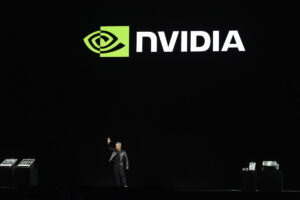Nvidia (NVDA) stock experienced a notable decline, dipping as much as 2.6% in early trading on Thursday and dragging down other chipmakers in its wake. This downturn is largely attributed to mounting concerns surrounding AI demand, exacerbating a challenging climate for the semiconductor sector as a whole. Year-to-date, Nvidia shares have now plummeted nearly 13%, marking its worst monthly performance since July 2022.
Analysts, like Stacy Rasgon from Bernstein, have weighed in on the stock’s struggle. Rasgon characterized this year as particularly challenging for Nvidia and its AI semiconductor counterparts, citing a mix of growth anxieties, supply chain disruptions, and increasing regulatory risks as contributing factors. “Sentiment has clearly pivoted for now on the AI group,” Rasgon noted, illustrating the shifting landscape for investors.
Recent industry news has done little to alleviate these investor worries. A report from the Financial Times revealed that CoreWeave, a private cloud services company and major customer of Nvidia, has encountered significant setbacks. Issues with delivery and missed deadlines resulted in lost business from Microsoft, casting a shadow over Nvidia’s outlook.
Moreover, Marvell Technology (MRVL), another custom AI chipmaker that services tech behemoths like Amazon and Microsoft, posted quarterly results that left investors unimpressed; the company’s guidance fell short of expectations, leading to a sharp drop of over 17% in its stock during Thursday’s trading. This comes on the heels of AI models increasingly becoming more cost-efficient, as demonstrated by Alibaba’s recent unveiling of a competitor to DeepSeek’s R-1 model, raising fears over potential reductions in AI hardware spending.
The tremors felt by Nvidia and its peers have been echoed across the industry, with other AI chipmakers seeing substantial declines as well. Broadcom (AVGO) sees a dip of 5%, Advanced Micro Devices (AMD) falls by 2%, while traditional partners like Arm (ARM) and Micron (MU) also felt the strain. Broadcom is anticipated to report its earnings later today, adding further suspense to an already turbulent trading day.
Investors are now carefully assessing the AI hype cycle, alongside the commitments made by big tech companies toward AI investments. Microsoft, Meta, Google, and Amazon are projected to spend over $300 billion collectively by 2025. Meanwhile, TSMC and Apple are making substantial commitments, with plans to invest $100 billion and $500 billion, respectively, to bolster their manufacturing capabilities for AI chips and servers in the U.S.
As market dynamics shift, it will be crucial for investors to remain informed about both the technological advancements and the economic realities impacting the semiconductor landscape. By keeping abreast of these developments and analyzing the shifting consumer demands and industry metrics, investors can better prepare for the inevitable ups and downs in the tech sector, positioning themselves advantageously within this volatile but potentially lucrative market.

